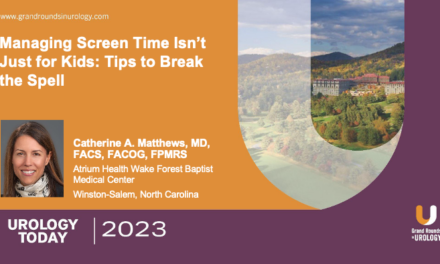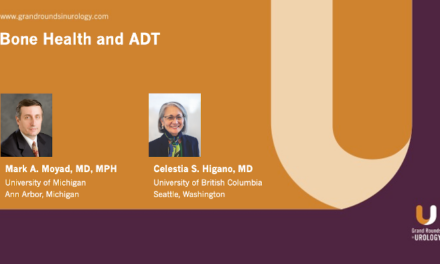David M. Albala, MD, presented “Ablative Local Technologies (HIFU, Cryo, SBRT, Laser, and Other Forms of Energy)” during the 34th International Prostate Cancer Update on February 12, 2024, in Vail, Colorado.
This content is available free to the GRU Community. Login or create an account to view it.
How to cite: Albala, David M. “Ablative Local Technologies (HIFU, Cryo, SBRT, Laser, and Other Forms of Energy).” February 2024. Accessed Jul 2025. https://grandroundsinurology.com/ablative-local-technologies-hifu-cryo-sbrt-laser-and-other-forms-of-energy/
Ablative Local Technologies (HIFU, Cryo, SBRT, Laser, and Other Forms of Energy) – Summary
David M. Albala, MD, provides an overview and comparison of current options for focal ablative therapy in prostate cancer treatment. He begins by briefly discussing the benefits of focal therapy before exploring the different types of focal therapy.
Dr. Albala categorizes focal therapies into temperature-based therapies and non-temperature-based therapies. He places High Intensity Focused Ultrasound, Laser Ablation, and Cryotherapy in the temperature-based focal therapies. Radiotherapies like seed, HDR, and EBRT join Photodynamic Therapy, Radiofrequency Ablation, Electroporation, and partial prostatectomy in the non-temperature-based category.
Dr. Albala discusses the importance of weighing cancer control with the preservation of function and patient QoL when considering focal therapies. He discusses the assessment process and the rate of failure for focal therapies. He underscores the process of patient selection and treatment planning prior to selecting a therapy.
He concludes by reviewing the delivery methods currently available for focal therapy. For each method, he presents the advantages, disadvantages, and ideal patient profile for each treatment.
About The 34th Annual International Prostate Cancer Update:
The International Prostate Cancer Update (IPCU), founded in 1990, is a multi-day CME conference focused on prostate cancer treatment updates with expert, international faculty. It is led by expert physicians and is designed for urologists, medical oncologists, radiation oncologists, and other healthcare professionals involved in the diagnosis and treatment of prostate cancer. The 34th iteration of the meeting occurred February 11-14, 2024 in Vail, Colorado. To view more educational presentations from IPCU 34, visit our collection page.
ABOUT THE AUTHOR
David M. Albala, MD, graduated with a geology degree from Lafayette College in Easton, Pennsylvania. He completed his medical school training at Michigan State University and went on to complete his surgical residency at the Dartmouth-Hitchcock Medical Center. Following this, Dr. Albala was an endourology fellow at Washington University Medical Center under the direction of Ralph V. Clayman. He practiced at Loyola University Medical Center in Chicago and rose from the ranks of Instructor toProfessor in Urology and Radiology in eight years. Ten years later, he became a tenured Professor at Duke University Medical Center in North Carolina. At Duke, he was Co-Director of the Endourology Fellowship and Director for the Center of Minimally Invasive and Robotic Urological Surgery. He has over 247 publications in peer-reviewed journals and has authored three textbooks in endourology and seven in general urology. He is the Editor-in-Chief of the Journal of Robotic Surgery. Dr. Albala serves on the editorial board for Medical Reviews in Urology, Current Opinions in Urology, and Urology Index and Reviews. He serves as a reviewer for eight surgical journals. He is a Visiting Professor in the Department of Urology at SUNY Downstate Health Sciences University. In addition, he was ranked among the top 2% of urologists in the world by a Stanford University study done in May 2021.
At the present time, Dr. Albala is Chief of Urology at Crouse Hospital and a member of Associated Medical Professionals in Syracuse, New York. He is considered a national and international authority in laparoscopic and robotic urological surgery and has been an active teacher in this area for over 20 years. His research and clinical interests have focused on robotic urological surgery. His other clinical interests include minimally invasive treatment of benign prostatic hypertrophy (BPH), biomarkers in prostate cancer, and the use of fibrin sealants in surgery. He has been a Visiting Professor at numerous institutions across the United States as well internationally in multiple countries including India, China, Iceland, Germany, France, Japan, Brazil, Australia, and Singapore. In addition, he has done operative demonstrations in over 32 countries and 23 states. He has trained 19 fellows in endourology and advanced robotic surgery.
In addition, Dr. Albala is a past White House Fellow who acted as a special assistant to Federico Pena, Secretary of Transportation, on classified and unclassified public health related issues.




